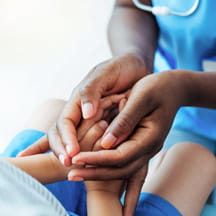Lawrence J. Burns is on a mission to help children and adolescents with behavioral and mental health issues—and to end the stigma tied to them—because of the national crisis that continues to haunt his state. As the president and CEO of The Children's Foundation, he recently wrote in a letter to the editor of Crain’s Detroit Business:
“Growing up is hard enough. Add the burden of mental health needs into the mix, and it can feel impossible. Far too many children and adolescents in Michigan lack access to behavioral health services, despite a soaring demand.”
Burns says that about 15 to 20 young people enter the Children’s Hospital of Michigan emergency room (ER) in mental health “crisis mode” every day. Despite the addition of a new ER, some pediatric patients requiring care for mental or behavioral health issues are “still in the ER on a gurney for up to a couple of weeks,” Burns says.
All this, he adds, because the current health care system is not meeting the needs of children with mental and behavioral health conditions—from a lack of pediatric psychiatrists, psychologists and longer-term care facilities to reimbursement challenges and the stigma that can often prevent kids from getting care. The key to tackling the problem, Burns says, is tackling it together.
“It is strength in numbers and getting the word out,” says Burns. “It’s also about bringing health systems together and breaking down barriers, so we can do something together versus individually or not at all.”
The power of partnership
While Burns and his team at the foundation routinely partner with a range of organizations to solve the national mental health problem, they also have helped launch the Michigan Advocates for Youth Behavioral Health, a new coalition of organizations and advocates determined to end stigma, change attitudes towards mental illness and break down barriers to quality behavioral health care for young people.
Most members of the coalition are providers on the front lines of caring for these patients. “By bringing them together, we have already created some additional conversations and, more importantly, partnerships. That’s one goal we’re continuing to see come to life.”
Early progress
The coalition held the inaugural The Children's Foundation Child and Adolescent Behavioral Health Summit in May 2019, featuring keynote presentations and breakouts on a range of topics including trauma, suicide prevention, anxiety and depression, bullying and substance abuse. Other meetings have occurred between smaller groups in the coalition, working to find new care solutions and ways to create long-term care facility options for the pediatric patients who need it.It takes an entire community
The Children’s Foundation has reached out to school superintendents across the state and school-related programs to help those who often are the first to see behaviors associated with mental or behavioral conditions.
“We’re trying to educate and provide support for teachers, because I would say across all socioeconomic avenues, but particularly underserved communities like Detroit or Flint, teachers are the front-line observers of these behavioral health issues in kids,” Burns says. “And historically, they are not prepared to deal with children who are having these issues.”
The Children’s Foundation also partnered with the Jewish Federation to create a series of 10 videos designed to help young people in crisis due to mental or behavioral issues. It’s one more way they’re trying to help everyone who might be around these kids.
Advice for other children’s hospitals
“Get out in the community, visit schools, visit as many types of groups as you can, listen and then create some short-term, medium-term and long-term goals together,” says Burns. “One role of a children’s hospital is to be an advocate for kids. So truly be an advocate in the communities you serve by bringing them together.”


